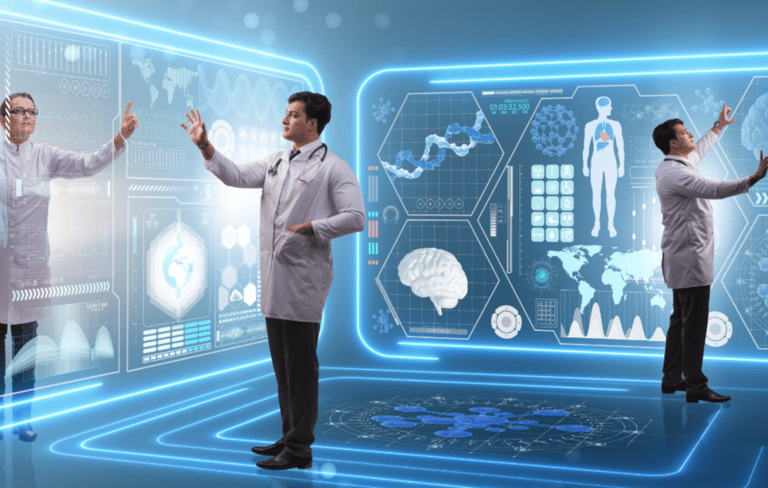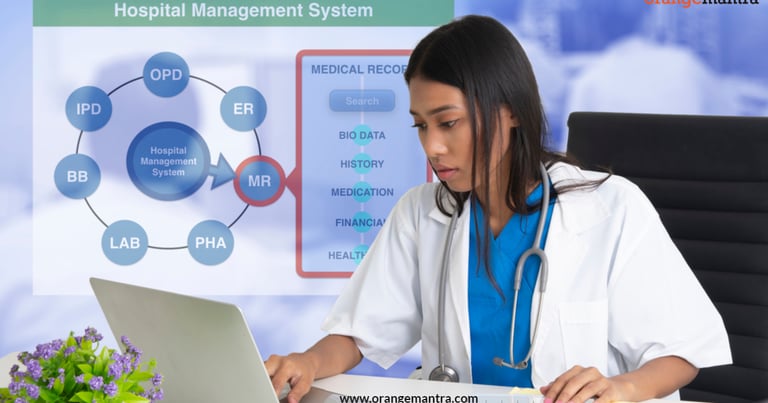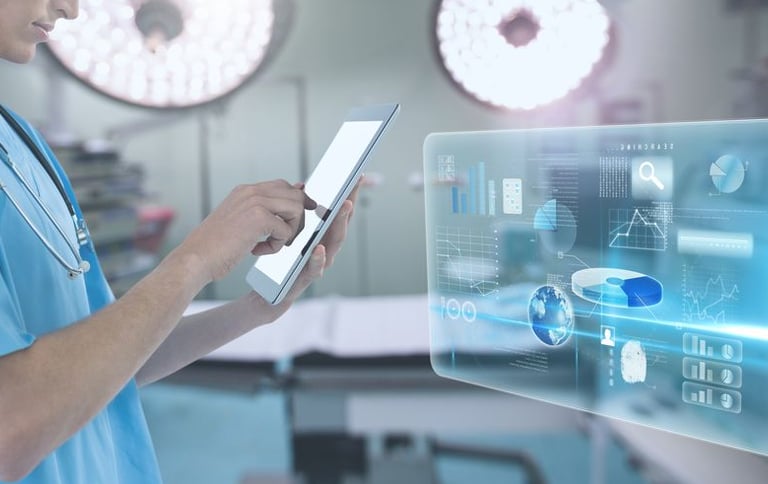✨ Introduction
A Healthcare Management System (HMS) is a comprehensive platform designed to streamline the administrative, financial, and clinical operations of healthcare institutions. The integration of Artificial Intelligence (AI) into HMS enhances efficiency, accuracy, and patient outcomes by leveraging data-driven decision-making, automation, and predictive analytics.
🤖 Role of AI in Healthcare Management
Patient Data Management
AI systems analyze Electronic Health Records (EHRs) to provide quick and accurate access to patient history.
Natural Language Processing (NLP) helps in extracting relevant information from unstructured data.
Diagnostics and Imaging
AI-powered tools interpret medical imaging (X-rays, MRIs, CT scans) to detect anomalies such as tumors or fractures with high precision.
Reduces human error and provides second-opinion support.
Predictive Analytics
Machine learning models predict disease outbreaks, patient deterioration, and readmission risks.
Assists in proactive care and resource planning.
Virtual Assistants and Chatbots
AI chatbots schedule appointments, answer FAQs, and provide medication reminders.
Enhances patient engagement and reduces administrative burden.
Clinical Decision Support
AI suggests treatment plans based on patient data and global clinical guidelines.
Aids doctors in personalized treatment recommendations.
Medical Robotics
Robots assisted by AI help in surgeries with minimal invasiveness and precision.
Improve post-surgery recovery and reduce human fatigue.
✅ Benefits of AI in Healthcare Management
Faster and more accurate diagnostics
Reduced operational costs
Enhanced patient satisfaction
Better clinical outcomes
Optimized hospital workflow
🚧 Challenges
Data privacy and security
High implementation costs
Need for regulatory compliance
Ethical concerns regarding automation
📌 Conclusion
AI in Healthcare Management Systems is revolutionizing the industry by making healthcare smarter, faster, and more accessible. As technology evolves, AI will become an indispensable partner to medical professionals, improving both patient care and operational excellence.






Top Software Training Courses in Healthcare
1. Electronic Health Records (EHR) / Electronic Medical Records (EMR) Software Training
Tools Covered: Epic, Cerner, Allscripts, Meditech, eClinicalWorks.
What You'll Learn:
Patient data management
Appointment scheduling
Clinical documentation
Billing workflows
Ideal for: Nurses, Admin Staff, Healthcare IT support
2. Healthcare Data Analytics
Tools Covered: Excel, SQL, Power BI, Python, R, Tableau.
What You'll Learn:
Data visualization
Predictive analytics
Population health insights
Quality and performance reporting
Ideal for: Data analysts, public health professionals, IT teams
4. Health Information Management Systems (HIMS)
Topics Covered:
Software systems used for hospital workflows
Compliance with HIPAA, HL7 standards
Interoperability and data exchange
Ideal for: IT professionals, hospital operations, health admins
5. Healthcare CRM and ERP Systems
Software: Salesforce Health Cloud, SAP Healthcare, Oracle Health, Microsoft Dynamics 365.
What You'll Learn:
Patient lifecycle management
Workflow automation
Revenue cycle management
Ideal for: Hospital administrators, business analysts, CRM consultants
6. Telemedicine and Virtual Care Platforms
Tools Covered: Practo, MDLIVE, Teladoc, Zoom for Healthcare.
What You'll Learn:
Virtual consultations setup
Integration with EHRs
Regulatory compliance (HIPAA/GDPR)
Ideal for: Doctors, IT support staff, clinic managers
7. Medical Imaging and Radiology Software
Tools Covered: PACS, DICOM, 3D Slicer, OsiriX, RadiAnt.
What You'll Learn:
Image storage and transfer
AI-based diagnostics
3D medical image processing
Ideal for: Radiologists, AI developers, medical imaging technicians
8. LIS (Laboratory Information System) Training
Software: LabWare, STARLIMS, Orchard Software.
What You'll Learn:
Test order management
Sample tracking
Report generation
Ideal for: Lab technicians, pathology staff, health IT teams
9. FHIR and HL7 Standards Training
Tools Covered: SMART on FHIR, HL7 Integration Engines (Mirth Connect).
What You'll Learn:
Data exchange in healthcare IT
API integration between EHRs
Ideal for: Healthcare developers, system integrators




© ZION AI Cloud LLP 2025. All Rights Reserved.
AI-Powered Business Automation | Cloud Solutions | Online Tech Coaching
📧 zionnexcloud@gmail.com | 🌐 www.zionaicloud.in| 📞 +91-9000844934
📍 Transforming businesses & empowering learners through technology.
Services
AI & Cloud Automation
CRM & Lead Management
HR & Employee Workflow
Marketing & Sales Automation
Chatbots & Conversational AI
Online Coaching
AI & Data Science Courses
Cloud & DevOps Training
Python, ML & Automation Tools
Industry Projects & Mentorship
